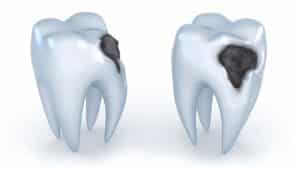What is Dental Decay?

Dental decay is the process by which the hard outer layer of a tooth – the enamel – is broken down and the softer inside layer – called dentine – becomes infected by bacteria.
As we use our teeth in the digestive system, they regularly come into contact with sugars and starches from food and drinks and form acids with our saliva. The acids attack the outside surface of our teeth (the enamel) causing it to weaken. This, in turn, can lead to destruction of the tooth over time and can cause cavities.
What happens if I leave dental decay?
There are different stages of tooth decay and each will present with different symptoms and risks. When decay first manifests, there are very few symptoms. As it advances and grows in size, it can cause sensitivity to hot and cold temperatures, as well as sugars. This can worsen into a constant throbbing ache.
If left untreated, the tooth can become infected as the decay reaches the nerve. This can present with an abscess that can cause severe pain, facial swelling, and fever. In advanced stages, the affected tooth will require root canal treatment or may need to be removed.
Once dental decay has occurred, the only way to correct it is by removing the rotting tooth material and replacing it with a filling. If this treatment is delayed, the infection will continue until the bacteria reach the pulp chamber, containing blood vessels and nerves, in the centre of the tooth. This is the stage at which a root canal treatment may be required.
How do I prevent dental decay?
Prevention starts with good oral hygiene. Oral hygiene is the process of cleaning the mouth and all of its structures – including the teeth, gums and tongue – and maintaining that cleanliness over time. It needs to be done regularly and consistently – preferably twice daily, every day. The appropriate tools to use include a manual or electric toothbrush, interdental/ interproximal brushes, dental floss, required. In other words, dental decay is a serious matter.
It is best to be proactive with the home care of your teeth along with routine dental check-ups and dental cleans.
Here are some things you can do to prevent the development of tooth decay:
- Use of fluoride, a mineral that helps strengthen the enamel. Fluoride can prevent the onset and progression of tooth decay, and even reverse, or stop, early-stage decay. Fluoride is found in most toothpastes and in Australian tap water
- A good at-home oral health routine; it is recommended you brush your teeth with a fluoridated toothpaste for two minutes, twice daily, flossing between your teeth daily. Such toothpastes are available for both adults and children. This oral hygiene routine is vital to get rid of plaque deposits as these can cause decay
- Make smart food choices, limiting or eliminating foods that are high in sugars and starches. Eat nutritious and balanced meals
- Sugar-free chewing gum; chewing gum can help the formation of saliva which acts to wash away any residual food debris
- Quit smoking; if you are a smoker, consider seeking help to cease the habit. Smoking is risk factor in a number of dental related ailments including tooth decay and gum disease
- Routine dental appointments; regular dental checks and cleans allows both the prevention of tooth decay developing, as well as early stage diagnosis and treatment if necessary. As early-stage tooth decay rarely causes any symptoms, it is best left to the professionals to keep an eye on your oral health
- The placement of sealants in at-risk teeth; if you have any teeth that have deep grooves (or fissures), your dentist may recommend sealing this area. This involves the placement of a non-invasive filling material, or fissure sealant. Teeth with deep grooves on their biting surface can often collect food debris that can cause cavities
A visit to a dental hygienist will help you choose the right equipment and establish the correct methods for your particular dental hygiene needs. The hygienist will manually remove any bacteria-bearing plaque and calculus that have accumulated on your teeth, setting you up to maintain good hygiene practices at home.
This minimisation of plaque in your mouth, combined with a dental friendly diet that limits starchy or sugary foods and sweet beverages, will see you well on the road to preventing dental decay.
